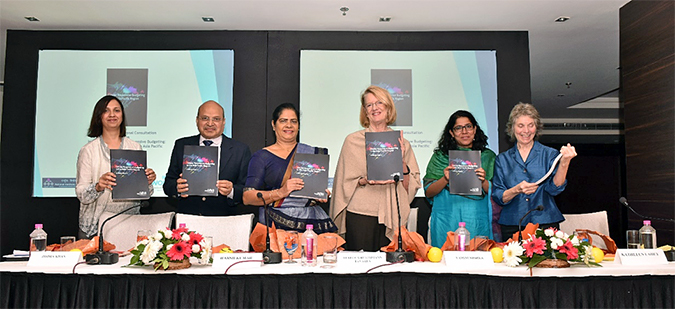New UN Women report finds progress but also big challenges on gender responsive budgeting in Asia
Date:
[Press Release]
Jaipur, India – Targeted fiscal policies have improved the quality and quantity of budgetary allocations for promoting gender equality in Asia and the Pacific but significant challenges remain, says a new UN Women report launched today.

Gender Responsive Budgeting in the Asia-Pacific Region: A Status Report is the first comprehensive review of these policies in the region. It is based on a detailed review of 26 countries and assesses almost two decades of such initiatives by government, parliaments and civil society groups.
Government and civil society representatives and academics launched the report at a meeting on “Innovations in Gender Responsive Budgeting: Sharing Experiences from the Asia-Pacific Region.” The meeting was organized by UN Women and the National Institute of Financial Management, Government of India.
While the region has made significant progress in recent years with new laws and policies on women’s rights, lack of resources remains a key impediment to implementation in many countries. In 2015, the 20-year review of the Beijing Platform for Action, the multilateral agreement on women’s rights, showed that many countries allocated very slim budgets to their national women’s rights bodies, faced serious financing gaps for implementing national action plans on gender equality, and received minimal amounts of foreign development assistance that targeted gender equality as a main objective.
The new UN Women report found that one of the most important benefits of gender responsive budgeting (GSB) is that it has improved systems to track allocations for gender equality efforts over time.
“On the other hand, some of the main challenges have centered on the availability and effectiveness of institutional mechanisms, and capacity gaps of key actors as well as critical contextual factors, including budget transparency and the political climate,” Miwa Kato, Regional Director of the UN Women Regional Office for Asia and the Pacific, says in the report’s foreword.
“Another set of challenges has been around sustaining the momentum of GSB in some countries and initiating it in some others, given the fact that there are some countries still in the process of setting up their governance structures.”
She says UN Women hoped that a better understanding of the status of these initiatives in the region will encourage all the key groups – including policymakers, parliamentarians, government officials, civil society members and international aid agencies – to implement gender equality commitments more effectively.
For more information and media enquiries:
Please contact:
Yamini Mishra
Email: [ Click to reveal ]
Email: [ Click to reveal ]
Montira Narkvichien
Email: [ Click to reveal ]